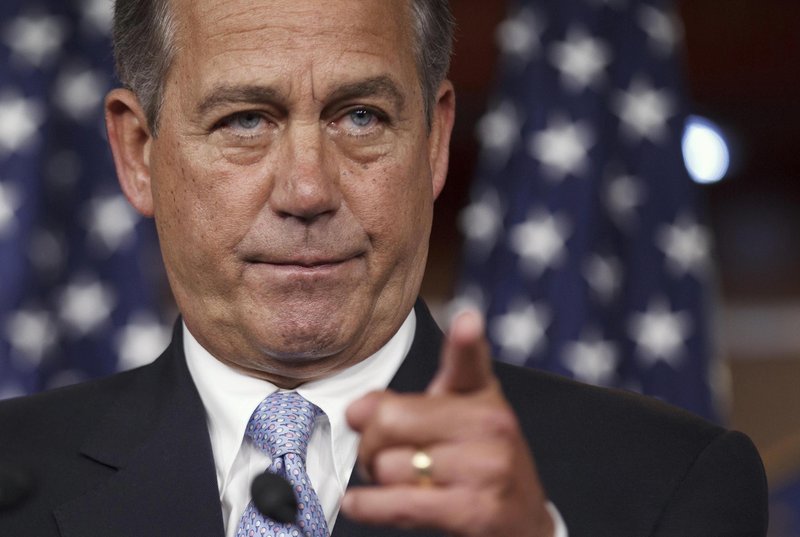WASHINGTON — House Speaker John Boehner set the stage Tuesday for another tense, partisan showdown over tax and spending policy later this year. He vowed to insist on big spending cuts before he will agree to a new debt ceiling – much like last summer’s debt showdown debacle – and also promised a vote before November’s elections on whether to prevent Bush-era tax cuts from expiring at year’s end, as scheduled.
Boehner’s address to a Washington budget forum had chilling echoes of the 2011 clash over increasing the debt ceiling, a weeks-long standoff between the Obama White House and Republicans in the House of Representatives that roiled financial markets, led to a downgrade of federal credit and nearly forced much of the government to close.
Another vote on raising the debt ceiling is expected later this year, probably after the Nov. 6 elections. On Tuesday, Boehner pledged to make it an “action-forcing event in a town that has become infamous for inaction. … When the time comes, I will again insist on my simple principle of cuts and reforms greater than the debt limit increase. This is the only avenue I see right now to force the elected leadership of this country to solve our structural fiscal imbalance.”
The Ohio Republican also pledged to fight to extend the Bush-era tax cuts, and called on President Obama to join him. “If there’s one action-forcing event that trumps all the rest – even the debt limit – it’s presidential leadership,” Boehner said.
Democrats scoffed.
“Republicans are once again choosing millionaires over the middle class, and Speaker Boehner is threatening to take our nation into another manufactured crisis that will harm America’s families,” said House Minority Leader Nancy Pelosi, D-Calif. Added Senate Democratic Policy Committee Chairman Charles Schumer of New York: “The last thing the country needs is a rerun of last summer’s debacle that nearly brought down our economy.”
The White House was somewhat more measured.
“Everyone except for elected members of Congress, the Republican Party, agrees with that general proposition that we need to take a balanced approach to our deficit and debt challenges,” said spokesman Jay Carney. “A balanced approach” to deficit reduction is Democratic shorthand for a package including tax increases as well as spending cuts.
Boehner flatly rejected higher taxes.
“Any sudden tax hike would hurt our economy, so this fall – before the election – the House of Representatives will vote to stop the largest tax increase in American history,” Boehner said, referring to the expiration of the Bush-era tax cuts. Since the House has a 242-190 GOP majority, the cuts are sure to pass. But they’re likely to go nowhere in the Senate, where Democrats control 53 of the 100 seats.
Last summer, Obama and House Republicans engaged in weeks of negotiations over cutting spending and increasing revenues. They ultimately agreed to raise the debt ceiling in stages and to impose automatic spending cuts, set to begin taking effect in January. The first round will total about $110 billion next year, half from defense and half from domestic programs.
More crucial to the fate of the debt are the Bush-era tax cuts, which have lowered income tax rates for the past 12 years and which will expire at the end of 2012. So will a host of other tax breaks, including the 2 percentage point cut in the Social Security payroll tax.
Extending the Bush-era tax cuts would cost roughly $3.8 trillion over 10 years, according to the nonpartisan Congressional Budget Office.
Obama and most Democrats want current income tax rates extended only for those earning less than $250,000. They would limit deductions for the wealthy and impose a higher tax rate on millionaires. Republicans want all the Bush-era rates extended, and presumptive GOP presidential candidate Mitt Romney wants them cut another 20 percent.
Boehner said his legislation “will give Congress time to work on broad-based tax reform that lowers rates for individuals and businesses while closing deductions, credits and special carve-outs.” The bill would establish a process by which Congress would consider “real tax reform” next year.
Send questions/comments to the editors.



Success. Please wait for the page to reload. If the page does not reload within 5 seconds, please refresh the page.
Enter your email and password to access comments.
Hi, to comment on stories you must . This profile is in addition to your subscription and website login.
Already have a commenting profile? .
Invalid username/password.
Please check your email to confirm and complete your registration.
Only subscribers are eligible to post comments. Please subscribe or login first for digital access. Here’s why.
Use the form below to reset your password. When you've submitted your account email, we will send an email with a reset code.